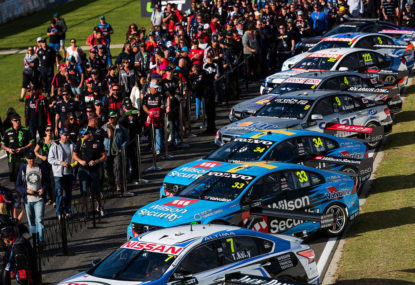Chinese Grand Prix talking points: Stroll has become the most hated F1 driver in a long time - but that's simply an unfair call!
The absolute vitriol against the Canadian that has come from the incident is beyond reprehensible.

“We’re up the front and here to stay,” stated Lee Holdsworth in April 2014, after taking the Erebus Mercedes AMG V8 Supercar to its first win. Within two years, that Mercedes AMG Supercar is now on the scrapheap.
The biggest news to come out of the off season this year was that Erebus motorsport has dropped the Mercedes V8 supercars it acquired in 2013. During the three seasons that it raced in the competition, it picked up two wins, but spent most of its time stuck in the midfield.
Instead, Erebus will be racing ex-Walkinshaw racing Holden Commodores.
Mercedes themselves were always an unusual fit for a family-sedan based touring car series. They never really gave Erebus any help with the cars beyond supplying them at the beginning of the ‘Car of the Future’ Era.
In 2015, Erebus took over engine development but were still unable to move the car up the grid.
The loss of Mercedes is the first sign of weakness in the ‘Car of the Future’ specification used by the series. It sees the number of manufacturers shrinking down to four, and the unenviable situation where the majority of the cars on the grid are Holdens.
In addition to the loss of Mercedes, Prodrive Racing and DJR Team Penske are losing the support of Ford this year, with the two teams expected to carry the Falcon FGX into the Gen2 Era.
Speaking of Gen2, there is still little in the way of news about any new manufacturers entering the sport as a result of the new regulations. The changes, which allow a wider variety of body types, such as performance coupes and hatchbacks, as well as turbocharged V4s and V6s, seem to be baring very little fruit.
BMW and Lexus, the latter of which scoped out the series by supplying the Safety and Medical Cars last year, have both opted against supplying Gen2 Supercars, instead preferring to field cars in the Australian GT championship, which runs on the worldwide GT3 specification.
Ford meanwhile have remained bullish on continuing their involvement with the series with models such as the Mustang and the Mondeo. Instead in 2016 they will be returning to Sportscar racing with the Ford GT, which will run in the IMSA WeatherTech SportsCar Championship in the US and the FIA World Endurance Championship globally.
Nissan meanwhile are still umming and arring about whether to continue the Altima in the series, which has only won one race in three seasons. Volvo seems to be the only team that is committed to racing from 2017 onwards, but if worse comes to worse and Holden and Volvo are the only two manufacturers on the grid, I can’t see them supplying more cars than they currently are.
The harsh truth might simply be that manufacturers aren’t willing to commit to a touring car series as unique as the V8s. Whereas most touring cars as nippy turbo hatchbacks, V8 supercars instead requires hulking normally aspirated V8 sedans, which don’t have environmental friendliness at the top of their priorities.
While its uniqueness makes V8 Supercars exciting and entertaining, it might also be its undoing.
So what does V8 supercars do if Gen2 flops? One option might be to link up with international counterparts DTM from Germany and Super GT from Japan.
These two series, where Mercedes and Nissan presently compete, are developing a set of regulations for both championships under the moniker “Class One”, which will see both competitions run under the same regulations, with turbocharged four cylinder engines.
Should V8 Supercars join these two series in developing an ‘international’ touring car formula, it could see an influx of manufacturers from Europe and Japan, the latter a big player in the current Australian car market.
Another option could be dropping Touring Cars altogether, and replacing the championship with a GT3 spec series. It is clear that V8 Supercars have thought about this option, which explains why they took over the promotion of the Bathurst 12 Hour.
It was not an attempt to shut a rival down, more so an attempt to evaluate the potential of a possible sports car competition.
So in the end, us V8 supercar fans should try to enjoy the championship for the next few years, because after that it will all change, for better or for worse.